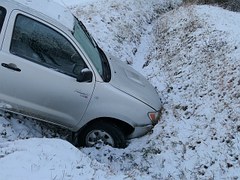If I Slide On Ice Am I Responsible For A Car Accident?
Every winter, our firm handles several cases involving the interplay of ice, road conditions, and motor vehicle accidents or other personal injury-causing events. A common theme in each of these cases is the responsibility of the drivers versus the conditions that may make an accident essentially inevitable, such as the presence of ice and snow.
The mere presence of ice or snow does not absolve a driver of responsibility for the accident.
Any individual is always going to be responsible for the exercise of caution in keeping his or her vehicle under control so as to avoid an accident. Does the presence of extreme natural conditions, such as ice or snow, alter that equation to the extent that, no matter the degree of caution exercised, an accident would occur anyway, and the individual is absolved of responsibility?

All drivers are charged, certainly, with the duty to act prudently with respect to the existing weather conditions. If there is ice, snow, sleet, freezing rain, a wintry mix, or any of the other of the myriad of hazard-causing conditions that can exist during the winter present on the roadways, drivers are charged with altering their speed and driving methods accordingly. Apart from the general rules, it has been argued that there are road conditions that are just simply so dangerous and so unmanageable that an accident between vehicles traveling on these roadways is unavoidable irrespective of the degree of caution used. An unavoidable accident is “an inevitable occurrence, not to be foreseen and prevented by vigilance, care, and attention, and not occasioned or contributed to, in any manner, by the act or omission of the company, its agents, employees or servants.” Washington Turnpike v. Case, 80 MD. 36 [1894].
If an accident is deemed unavoidable due to ice and snow, a driver may not be responsible.
Maryland courts long ago decided that juries could not be given an instruction that a given accident is unavoidable as a matter of law, but rather they were to weigh the case using principles of negligence and causation. Nevertheless, creative lawyers are free to argue that some road conditions are just simply so hazardous that there was no way to avoid an accident. As Attorney Eric T. Kirk will tell you.
An analogous example is the mammoth traffic circle around the Arc d’ Triomphe in Paris. Here, traffic enters the circle from 12 directions. Accidents are so common, and it is, historically, so difficult to tell who was at fault, or contributed to an accident, that insurance companies have given up. They split the cost of every accident 50/50. No litigation, no complaint, on to the next claim, payment for which will also be split 50/50. Accidents here are considered inevitable and unavoidable. Of course Maryland insurance company defense lawyers love to argue that “yes, there was an accident”, but it was really no one’s fault, or at least, not the defendant’s fault.
Some common scenarios arise involving ice and snow on the roadways. Probably the most recurrent is one in which one vehicle slides, on ice, into the rear of one or more vehicles. The issues that will be argued here are:
- is the person driving too fast for conditions, or
- were the conditions of that roadway so hazardous that the following care really had no chance to stop, or could not have stopped, and was therefore not negligent.

An additional common scenario is one in which a driver loses control on ice on the roadway and damages the property of another but in the absence of another driver being involved. Since there was no other driver on the roadway, a lawyer is free to argue that the conditions of the roadways were such that a person, reasonably and prudently, should have known that taking the wheel under such circumstances was in and of itself unreasonable, and an act of negligence. Not surprisingly, more experienced drivers are typically more well-suited and better able to handle icy condition then a novice, inexperienced drivers. In that same vein, someone who has lived, and driven, north of the Mason-Dixon line for their entire life is likely better able to handle icy road conditions that someone who has lived in the deep south.
The law requires each of us to conform our conduct to the circumstances as we know them to exist. For example, speed, or a manner of driving in the absence of icy conditions that might be considered perfectly reasonable, might well be considered unreasonable, and therefore negligent, in the presence of icy conditions. An individual is charged with the responsibility to conform their conduct to match conditions, and a failure to do so can lead to liability for causing an accident.


